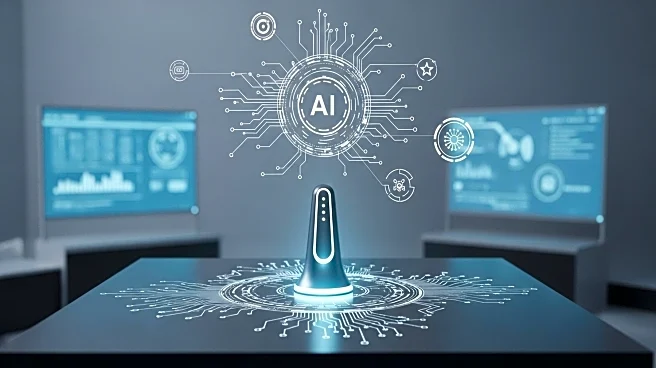What's Happening?
Northrop Grumman has introduced its Beacon project, a testbed ecosystem designed to accelerate the development of autonomous mission capabilities. The initiative connects third-party mission software with Northrop Grumman's flight software, enabling collaboration with leading companies in AI and autonomy. The Beacon project is centered around the Scaled Composites Model 437 Vanguard aircraft, which has been converted for autonomous flight. This platform allows Northrop Grumman and its partners to integrate AI and autonomy into their systems, facilitating manned-unmanned teaming. The first group of participating companies includes Applied Intuition, Autonodyne, Merlin Labs, Red 6, Shield AI, and SoarTech. Beacon flights feature a safety pilot, providing the option to switch between fully crewed and fully autonomous control.
Why It's Important?
The Beacon project represents a significant advancement in the integration of AI and autonomous technologies within the aerospace sector. By fostering collaboration with various companies, Northrop Grumman is positioning itself at the forefront of innovation in autonomous flight capabilities. This initiative could lead to enhanced mission readiness and operational efficiency for military and defense applications. The ability to seamlessly integrate AI into flight systems may offer strategic advantages in terms of speed, precision, and adaptability in complex environments. As the aerospace industry increasingly embraces autonomy, projects like Beacon could redefine operational paradigms and drive technological progress.
What's Next?
Northrop Grumman plans to continue developing the Beacon ecosystem by expanding partnerships and refining its autonomous flight capabilities. The ongoing collaboration with AI and autonomy companies is expected to yield new mission-specific technologies that can be integrated into the Beacon platform. Future developments may include more sophisticated navigation and teaming capabilities, enhancing the effectiveness of manned-unmanned operations. As the project progresses, stakeholders in the defense and aerospace sectors will likely monitor its impact on mission execution and strategic planning.
Beyond the Headlines
The Beacon project may have broader implications for the ethical and regulatory aspects of autonomous flight. As AI-driven systems become more prevalent, questions regarding safety, accountability, and decision-making in autonomous operations will need to be addressed. The collaboration between Northrop Grumman and its partners could also influence industry standards and best practices for integrating AI into aerospace technologies. Long-term, the success of the Beacon project could pave the way for more widespread adoption of autonomous systems across various sectors, potentially transforming how missions are conducted.









